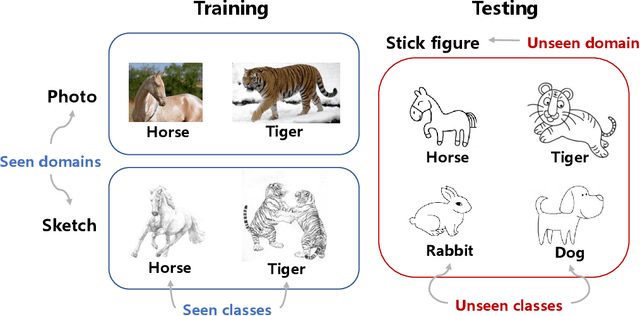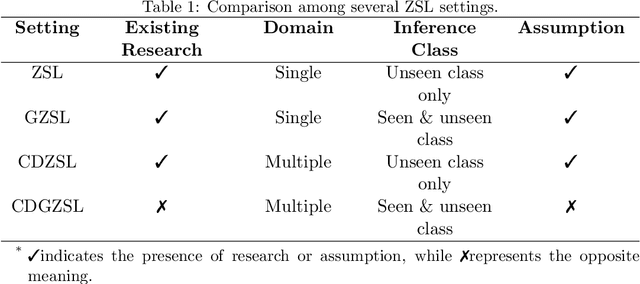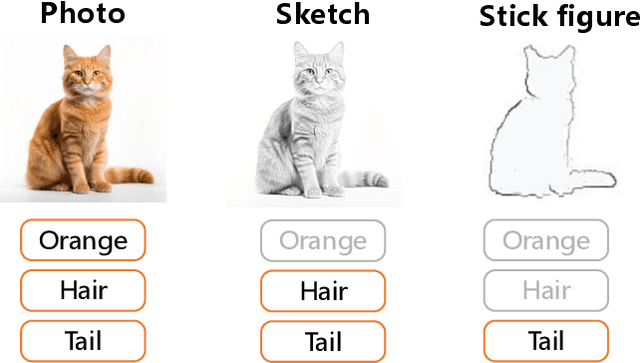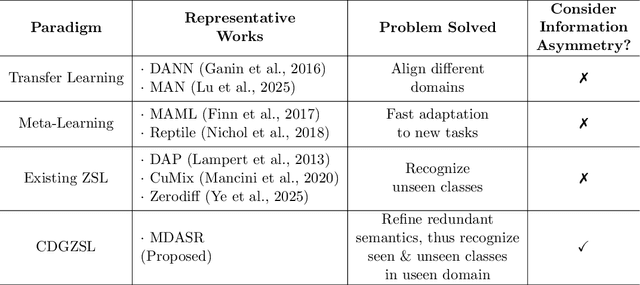Jiaqi Yue
Less but Better: Enabling Generalized Zero-shot Learning Towards Unseen Domains by Intrinsic Learning from Redundant LLM Semantics
Mar 21, 2024



Abstract:Generalized zero-shot learning (GZSL) focuses on recognizing seen and unseen classes against domain shift problem (DSP) where data of unseen classes may be misclassified as seen classes. However, existing GZSL is still limited to seen domains. In the current work, we pioneer cross-domain GZSL (CDGZSL) which addresses GZSL towards unseen domains. Different from existing GZSL methods which alleviate DSP by generating features of unseen classes with semantics, CDGZSL needs to construct a common feature space across domains and acquire the corresponding intrinsic semantics shared among domains to transfer from seen to unseen domains. Considering the information asymmetry problem caused by redundant class semantics annotated with large language models (LLMs), we present Meta Domain Alignment Semantic Refinement (MDASR). Technically, MDASR consists of two parts: Inter-class Similarity Alignment (ISA), which eliminates the non-intrinsic semantics not shared across all domains under the guidance of inter-class feature relationships, and Unseen-class Meta Generation (UMG), which preserves intrinsic semantics to maintain connectivity between seen and unseen classes by simulating feature generation. MDASR effectively aligns the redundant semantic space with the common feature space, mitigating the information asymmetry in CDGZSL. The effectiveness of MDASR is demonstrated on the Office-Home and Mini-DomainNet, and we have shared the LLM-based semantics for these datasets as the benchmark.
Learning to better see the unseen: Broad-Deep Mixed Anti-Forgetting Framework for Incremental Zero-Shot Fault Diagnosis
Mar 18, 2024Abstract:Zero-shot fault diagnosis (ZSFD) is capable of identifying unseen faults via predicting fault attributes labeled by human experts. We first recognize the demand of ZSFD to deal with continuous changes in industrial processes, i.e., the model's ability to adapt to new fault categories and attributes while avoiding forgetting the diagnosis ability learned previously. To overcome the issue that the existing ZSFD paradigm cannot learn from evolving streams of training data in industrial scenarios, the incremental ZSFD (IZSFD) paradigm is proposed for the first time, which incorporates category increment and attribute increment for both traditional ZSFD and generalized ZSFD paradigms. To achieve IZSFD, we present a broad-deep mixed anti-forgetting framework (BDMAFF) that aims to learn from new fault categories and attributes. To tackle the issue of forgetting, BDMAFF effectively accumulates previously acquired knowledge from two perspectives: features and attribute prototypes. The feature memory is established through a deep generative model that employs anti-forgetting training strategies, ensuring the generation quality of historical categories is supervised and maintained. The diagnosis model SEEs the UNSEEN faults with the help of generated samples from the generative model. The attribute prototype memory is established through a diagnosis model inspired by the broad learning system. Unlike traditional incremental learning algorithms, BDMAFF introduces a memory-driven iterative update strategy for the diagnosis model, which allows the model to learn new faults and attributes without requiring the storage of all historical training samples. The effectiveness of the proposed method is verified by a real hydraulic system and the Tennessee-Eastman benchmark process.
Addressing Domain Shift via Knowledge Space Sharing for Generalized Zero-Shot Industrial Fault Diagnosis
Jun 04, 2023Abstract:Fault diagnosis is a critical aspect of industrial safety, and supervised industrial fault diagnosis has been extensively researched. However, obtaining fault samples of all categories for model training can be challenging due to cost and safety concerns. As a result, the generalized zero-shot industrial fault diagnosis has gained attention as it aims to diagnose both seen and unseen faults. Nevertheless, the lack of unseen fault data for training poses a challenging domain shift problem (DSP), where unseen faults are often identified as seen faults. In this article, we propose a knowledge space sharing (KSS) model to address the DSP in the generalized zero-shot industrial fault diagnosis task. The KSS model includes a generation mechanism (KSS-G) and a discrimination mechanism (KSS-D). KSS-G generates samples for rare faults by recombining transferable attribute features extracted from seen samples under the guidance of auxiliary knowledge. KSS-D is trained in a supervised way with the help of generated samples, which aims to address the DSP by modeling seen categories in the knowledge space. KSS-D avoids misclassifying rare faults as seen faults and identifies seen fault samples. We conduct generalized zero-shot diagnosis experiments on the benchmark Tennessee-Eastman process, and our results show that our approach outperforms state-of-the-art methods for the generalized zero-shot industrial fault diagnosis problem.
 Add to Chrome
Add to Chrome Add to Firefox
Add to Firefox Add to Edge
Add to Edge